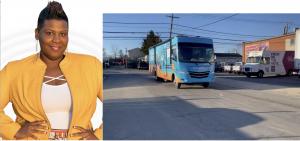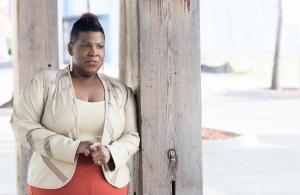National Tenant Group will Host Press Conference to Announce the Launch of the “Independent Housing Authority”
WASHINGTON, D.C., UNITED STATES, June 29, 2023/EINPresswire.com/ -- The National Tenant Group will host a press conference on Tuesday, July 4th at 12pm EST at the Freedom Plaza to announce their independence from the traditional structures of government-owned public housing authorities. The address is 1325 Pennsylvania Ave, NW, Washington, DC 20004. Live Stream is also available. Please register via https://bit.ly/canilive-new-era-event.
Take a closer look at the concerning dilemmas and experience, as expressed by Racquel W. Jones, CEO & Founder of Can I Live, Inc., a national public housing tenants association.
SUBSTANDARD QUALITY OF LIFE FOR FAMILIES
Housing and Urban Development’s (HUD) Real Estate Assessment Center conducts physical property inspections for those that are owned, insured or subsidized by HUD, including public housing and multifamily-assisted housing. Resident Service and Satisfaction Indicators were dropped in 2011, after the request of several Public Housing Agency (PHA) associations who carry out the interest of the PHA advocated for its removal.
To this end, PHA’s are being granted high performance status, while families live in some of the most deplorable living conditions. Single mothers and their children are essentially prisoners in their own homes.
HUD appropriates hundreds of millions of dollars to PHA’s to operate poor performing programs that fail to adequately address the needs of families who are disregarded. Since 2012, Can I Live has diligently knocked on the PHA’s doors, visited their trade shows, corresponded through email, direct mail, phone calls, and few will even answer their phones and/or respond to their emails.
During the national WEALTHFAIR TOUR, Can I Live has engaged with more than 2,000 PHA’s and their contractors only to be rejected by 99% of them.
ECONOMIC DETRIMENT FOR HUD-ASSISTED FAMILIES
Section 3 is a provision of the HUD Act of 1968 found at 12 U.S.C. 1701u and at the 24 CFR Part 75. Per this statutory language, recipients of HUD funds (i.e., grantees and contractors) are to ensure that “to the greatest extent feasible,” when certain HUD funds are used to assist housing and community development projects, preference for construction-related training, jobs, and contracting opportunities go to low- and very low-income people and to businesses that are owned by low- and very low-income persons or businesses that hire them.
While these opportunities are both gender and race neutral, they are not made accessible to HUD assisted families who receive housing subsidies.
Section 3 is the starting point for all things self-sufficiency, yet private developers through HUD’s Rental Assistance Demonstration (RAD) are afforded the opportunities to own what were once federal-only properties. With over 15 billion triggered every year through Section 3 provisions, there is no accountability to the triggered projects, no reports turned in, and no answer from HUD to provide a statement of established authority over the gross neglect of this program. Can I Live presented a Freedom of Information request back in November 2021, which remains open and ignored.
Can I Live has filed an administrative brief in January 2023 against HUD, which remains unanswered.
PHA’s and the cities in which they operate both receive substantial funding from HUD to help reduce concentrated poverty, increase affordable housing, and aid families in achieving self-sufficiency, yet families’ incomes remain low for decades.
Resident-owned businesses are denied contracting opportunities and/or the training to assist their small businesses in the capacity needed to perform.
Single mothers who populate the roles of HUD-funded self-sufficiency programs consistently tell their caseworkers that the benefits of working do not outweigh the benefits they receive from other social entitlement programs. This Welfare Benefits Cliff is, and continues to be, the number one culprit in families not taking advantage of these temporary economic opportunities.
Even after hearing this from thousands of residents, the resident services staff are in no position to advocate for families for the loss of their incomes and positions. In most cases, resident services departments are overworked and underpaid departments with professionals who have great intentions but are inadequately trained with the tools for the job. For this reason, residents feel ignored with complaints of staff being unresponsive to their needs.
EQUITY, ACCESS, AND INCLUSION ISSUES
The Housing Choice Voucher (HCV) Homeownership Program, also known as Section 8, provides vouchers to families so that they can purchase a home and receive monthly assistance in meeting homeownership expenses.
However, families are losing their vouchers due to their inability to find decent, safe and affordable housing in communities that promise opportunity and choice. Landlords are refusing tenants with vouchers after paying numerous application fees. While families have the right to move, many in these cases are stuck to endure the unsafe and rodent-infested living conditions of their present landlords (the PHA).
While HUD’s current housing homes stock is offered to real estate companies and developers, families are left out of the equation of access to decent, safe, and affordable housing, which is one of the major components to HUD’s mission. Additionally, PHA’s have an “option” to offer both a Self-Sufficiency and/or Homeownership Program.
The fate of families and their ability to create wealth are dependent upon too many variables outside of their own control and decision making (i.e., banks not underwriting the HCV transactions, PHA’s not offering, HUD not holding anyone accountable, etc.).
SOLUTION-DRIVEN
Can I Live is now Can I Live Housing Authority–an independent, non-governmental, private non-profit corporation funded primarily through public support. Can I Live Housing Authority aims to liberate the working poor and unemployed mothers of Americans who are living in crime-ridden neighborhoods in the poorest performing public schools and fewest opportunities for youth engagement, employment, access to transportation, and other basic human services.
Can I Live Housing Authority will brashly challenge the mindset of welfare dependency while crafting bold, creative solutions to move more than ONE MILLION WELFARE MOMS currently receiving entitlements in America through the healing and workforce training necessary to walk out of their lives without subsidies and handouts.
Accomplished through public-private partnerships, these solutions will build on the best of local understanding to create flexible, evidence-based answers to local poverty for urban and rural poor across America.
Take a closer look at the concerning dilemmas and experience, as expressed by Racquel W. Jones, CEO & Founder of Can I Live, Inc., a national public housing tenants association.
SUBSTANDARD QUALITY OF LIFE FOR FAMILIES
Housing and Urban Development’s (HUD) Real Estate Assessment Center conducts physical property inspections for those that are owned, insured or subsidized by HUD, including public housing and multifamily-assisted housing. Resident Service and Satisfaction Indicators were dropped in 2011, after the request of several Public Housing Agency (PHA) associations who carry out the interest of the PHA advocated for its removal.
To this end, PHA’s are being granted high performance status, while families live in some of the most deplorable living conditions. Single mothers and their children are essentially prisoners in their own homes.
HUD appropriates hundreds of millions of dollars to PHA’s to operate poor performing programs that fail to adequately address the needs of families who are disregarded. Since 2012, Can I Live has diligently knocked on the PHA’s doors, visited their trade shows, corresponded through email, direct mail, phone calls, and few will even answer their phones and/or respond to their emails.
During the national WEALTHFAIR TOUR, Can I Live has engaged with more than 2,000 PHA’s and their contractors only to be rejected by 99% of them.
ECONOMIC DETRIMENT FOR HUD-ASSISTED FAMILIES
Section 3 is a provision of the HUD Act of 1968 found at 12 U.S.C. 1701u and at the 24 CFR Part 75. Per this statutory language, recipients of HUD funds (i.e., grantees and contractors) are to ensure that “to the greatest extent feasible,” when certain HUD funds are used to assist housing and community development projects, preference for construction-related training, jobs, and contracting opportunities go to low- and very low-income people and to businesses that are owned by low- and very low-income persons or businesses that hire them.
While these opportunities are both gender and race neutral, they are not made accessible to HUD assisted families who receive housing subsidies.
Section 3 is the starting point for all things self-sufficiency, yet private developers through HUD’s Rental Assistance Demonstration (RAD) are afforded the opportunities to own what were once federal-only properties. With over 15 billion triggered every year through Section 3 provisions, there is no accountability to the triggered projects, no reports turned in, and no answer from HUD to provide a statement of established authority over the gross neglect of this program. Can I Live presented a Freedom of Information request back in November 2021, which remains open and ignored.
Can I Live has filed an administrative brief in January 2023 against HUD, which remains unanswered.
PHA’s and the cities in which they operate both receive substantial funding from HUD to help reduce concentrated poverty, increase affordable housing, and aid families in achieving self-sufficiency, yet families’ incomes remain low for decades.
Resident-owned businesses are denied contracting opportunities and/or the training to assist their small businesses in the capacity needed to perform.
Single mothers who populate the roles of HUD-funded self-sufficiency programs consistently tell their caseworkers that the benefits of working do not outweigh the benefits they receive from other social entitlement programs. This Welfare Benefits Cliff is, and continues to be, the number one culprit in families not taking advantage of these temporary economic opportunities.
Even after hearing this from thousands of residents, the resident services staff are in no position to advocate for families for the loss of their incomes and positions. In most cases, resident services departments are overworked and underpaid departments with professionals who have great intentions but are inadequately trained with the tools for the job. For this reason, residents feel ignored with complaints of staff being unresponsive to their needs.
EQUITY, ACCESS, AND INCLUSION ISSUES
The Housing Choice Voucher (HCV) Homeownership Program, also known as Section 8, provides vouchers to families so that they can purchase a home and receive monthly assistance in meeting homeownership expenses.
However, families are losing their vouchers due to their inability to find decent, safe and affordable housing in communities that promise opportunity and choice. Landlords are refusing tenants with vouchers after paying numerous application fees. While families have the right to move, many in these cases are stuck to endure the unsafe and rodent-infested living conditions of their present landlords (the PHA).
While HUD’s current housing homes stock is offered to real estate companies and developers, families are left out of the equation of access to decent, safe, and affordable housing, which is one of the major components to HUD’s mission. Additionally, PHA’s have an “option” to offer both a Self-Sufficiency and/or Homeownership Program.
The fate of families and their ability to create wealth are dependent upon too many variables outside of their own control and decision making (i.e., banks not underwriting the HCV transactions, PHA’s not offering, HUD not holding anyone accountable, etc.).
SOLUTION-DRIVEN
Can I Live is now Can I Live Housing Authority–an independent, non-governmental, private non-profit corporation funded primarily through public support. Can I Live Housing Authority aims to liberate the working poor and unemployed mothers of Americans who are living in crime-ridden neighborhoods in the poorest performing public schools and fewest opportunities for youth engagement, employment, access to transportation, and other basic human services.
Can I Live Housing Authority will brashly challenge the mindset of welfare dependency while crafting bold, creative solutions to move more than ONE MILLION WELFARE MOMS currently receiving entitlements in America through the healing and workforce training necessary to walk out of their lives without subsidies and handouts.
Accomplished through public-private partnerships, these solutions will build on the best of local understanding to create flexible, evidence-based answers to local poverty for urban and rural poor across America.
Ruth Davis
Ruth Davis Consulting LLC (RDC)
RuthDavisConsultingLLC@gmail.com
Visit us on social media:
Facebook
Twitter
LinkedIn
Instagram
Other
What is the WEALTHFAIR TOUR?
Legal Disclaimer:
EIN Presswire provides this news content "as is" without warranty of any kind. We do not accept any responsibility or liability for the accuracy, content, images, videos, licenses, completeness, legality, or reliability of the information contained in this article. If you have any complaints or copyright issues related to this article, kindly contact the author above.



